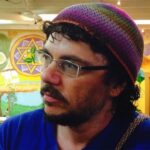“On Tisha B’Av, we imagine that the land mourns with us. But that’s our human-centered way of seeing things. From God’s perspective, which is closer to an ecological perspective, the well-being of the land comes first. When humanity violates the land, it dooms itself to be treated like a plague from which the land must become healed.”
The beginning of Deuteronomy is filled with promises about taking possession of the land of Canaan. But we always read parshat Devarim on the Shabbat before Tisha B’Av, when we remember that our ancestors lost possession of that land and went into exile.
The Torah teaches that the way to live long in the land and avoid exile is not by having the strongest army, but by fulfilling the covenant of the Torah. And it tells us that one mitzvah is most important for making this happen: the Sabbatical or Shmita year, when the land rests.
The Shmita year is a prescription for living sustainably upon the earth. Not only does the land rest every seventh year, but the year following every seventh Shmita year — the fiftieth year of Jubilee — every family returns to the land it received when the land was first distributed among the Israelite tribes.
That means that in a world where Shmita is observed, poverty can never become permanent, the land is always renewed, and justice becomes the foundation of relations among human beings and between the people and the land. Harmony reigns in a tripartite covenant between God, the people, and the land.
In the Torah’s description of Shmita, God’s commitment to the land is paramount. If we follow its prescriptions, we will “dwell in the land securely” (Lev. 26:5). If not, God promises to wipe out the people and send the surviving remnant into exile. It’s as if God were telling us, “I love you and I love the land, but if you make me choose between you, then I choose the land.”
Choosing the land paradoxically means devastating the land — “I will desolate the land, and your enemies will be desolate over her” (26:32). But God makes an additional promise to the land: all the days of exile she will rest, and make up for the rest that the Israelites denied her. More than that, Leviticus 26 promises that the land will “enjoy” or “desire” her sabbaths, or, in another translation, she will “will” or demand her sabbaths — tirtzeh et shabtoteha (26:34-35). It’s not just good for the land to rest. The land, so to speak, knows this and actively anticipates it.
That is exactly how Second Chronicles interprets Jeremiah: the people were exiled “to fulfill the word of YHVH by the mouth of Jeremiah, until the land enjoyed her sabbaths, all the days of her desolation when she rested, until seventy years were filled.” (36:21)
But that is the exact opposite of what we read in Lamentations on Tisha B’Av, where the land itself suffers from exile alongside the people: “Zion’s roads are mourning… Zion stretched our her hands, there is no comfort for her… Jerusalem became and outcast…” (Lam 1:4, 17). On Tisha B’Av, we imagine that the land mourns with us. But that’s our human-centered way of seeing things. From God’s perspective, which is closer to an ecological perspective, the well-being of the land comes first. When humanity violates the land, it dooms itself to be treated like a plague from which the land must become healed.
The haftarah for Devarim ends: “Zion will be redeemed through justice” — as we see, that means justice for the people and justice for the earth. It means living in alignment both with the land and with divine intention. May we learn to live thus, as the Shmita year teaches us.
You can download Rabbi Seidenberg’s translation of Lamentations from neohasid.org/resources/
 Rabbi David Seidenberg is the creator of neohasid.org and the author of Kabbalah and Ecology: God’s Image in the More-Than-Human World. One of our foremost Jewish ecotheologians, David holds ordination from both JTS and Reb Zalman and teaches around the world about Judaism and spirituality, human rights, ecology, animal rights, and astronomy. David is well-known for his liturgy as well as his translation of Lamentations, and is an avid dancer and a composer of Jewish liturgical music.
Rabbi David Seidenberg is the creator of neohasid.org and the author of Kabbalah and Ecology: God’s Image in the More-Than-Human World. One of our foremost Jewish ecotheologians, David holds ordination from both JTS and Reb Zalman and teaches around the world about Judaism and spirituality, human rights, ecology, animal rights, and astronomy. David is well-known for his liturgy as well as his translation of Lamentations, and is an avid dancer and a composer of Jewish liturgical music.